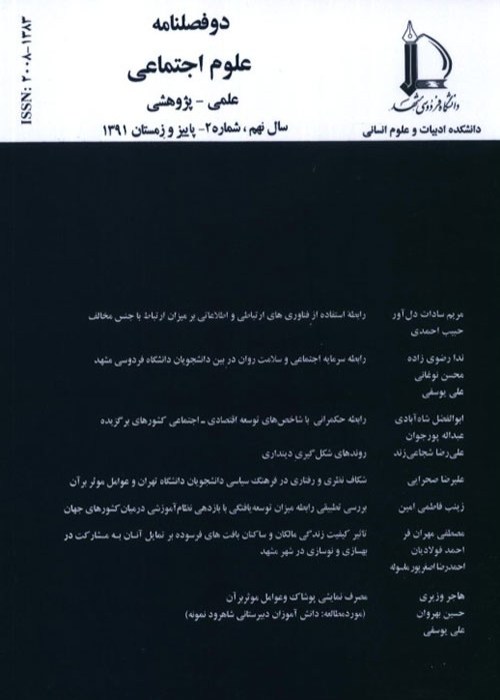Marginalized Women and Socialization of Violence in the Family
Family is one of the most insecure social units in terms of violent incidence. The likelihood of being killed, wounded or abused in the family by its members is very high (Gelles, 1979). Particularly women and children are being subjected to violence more by members of the family. Researches have shown that violence is the result of inequality in power. Power is distributed unevenly in various societies in a variety of ways, based on gender, ethnicity, and socio-economic base (Lombard, 2015). Therefore, it can be assumed that women are in very difficult conditions in the marginal areas of cities, because they have very little power in the family and community. On the other hand, based on the theory of social learning, violence in childhood is learned through experience and observation. Given the fact that mothers usually have the most contact with children in their families and are responsible for their discipline and upbringing the question arises as to whether fostering violent personalities is a direct result of women's behavior. What is the role of the weakness of the family's social and economic status in this regard? In this research, it has been attempted to clarify the role of women in this field by identifying the chain of factors that end in violence.
According to the social pressure theories, those people act violent who firstly feel a severe socio-economic deprivation and secondly, are acquainted with the value of the higher classes, and feel inferior to it. Social learning theory considers violence as the result of socialization (Akers, 1998). Violence in this theory is a form of learned social behavior which is dependent on the experiences of the children in the family and on the other hand, it is related to the differences in gender socialization in the family that allows girls and boys to be socialized with different norms (Moradi & Zandi, 2007). For feminists, the cause of violence lies in the power inequality between the two sexes. They believe that men are resorting to violence against women, using the power that social institutions grant them. But women also have some power and use it for reasons such as self-defense, jealousy, control, anger and deprivation (Dutton & White, 2013). According to the theories, this study considered two groups of factors: 1. The childhood experiences that indicate socialization status and is influenced by the power relations of the family 2. Variables such as age, sex, marital and social status, which represent the person's position in the social surrounding environment. The general assumption of the research is that in childhood, two factors of learning and power relationships within the family are involved in the formation of violent people, but in adulthood, social inequalities in the metropolitan environment will exacerbate violence and return it to weak members of the families.
This study was conducted in a survey method. The population of the study consists of 15-29 years old young people living in two marginal areas of Kermanshah, Jafarabad and Dolatabad among them, 384 people were selected by multi-stage random cluster sampling method using the Cochran formula with the assumption of maximum variance and 95% confidence interval. Data were collected through a researcher-made questionnaire. Validity of the scales provided by the formal method and their reliability confirmed by Cronbach's Alpha measure.
According to the results of this study, violent behaviors are common among the marginalized youth of Kermanshah. Violence occurs in most cases at night and at home, and is more targeted towards family members. The rate of violence among boys is higher than that of girls. In addition, there is a positive and strong relationship between the degree of violence and the experience of child abuse.
The study showed that in the marginal areas of Kermanshah, social failure and socialization are mutually reinforcing and help create harsh characters. Violence is practicable where power distribution is unequal. The family is where age and gender inequality exist. Therefore, according to the dominant norms, it is possible to impose the violent behavior of parents on children and men on women. But women are not completely powerless in the family. Based on socially acceptable norms, mothers as primary educators have the right to direct children. They train aggressive children under the guise of discipline. These children, as soon as they reach social legitimacy as brothers or husbands combine the pressures from the deprivation of economic and social with childhood learned violence and brutalize female members of the family. Therefore, in a situation of deprivation and the pressure caused by marginalization, the family creates a two-way relationship with violence. On the one hand, unequal power relations in the family and the legitimacy of violence by parents, which themselves are under the influence of social failure, are the basis for the cultivation of violent people and on the other hand, most violent behaviors are oriented towards family members.
- حق عضویت دریافتی صرف حمایت از نشریات عضو و نگهداری، تکمیل و توسعه مگیران میشود.
- پرداخت حق اشتراک و دانلود مقالات اجازه بازنشر آن در سایر رسانههای چاپی و دیجیتال را به کاربر نمیدهد.




